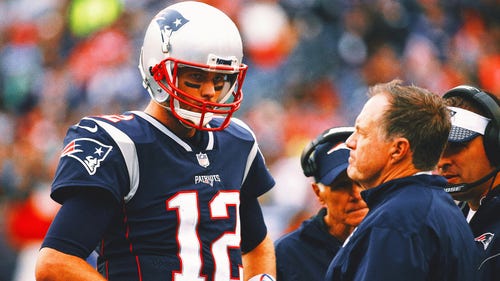
Tom Brady's charity funding mainly comes from another nonprofit. What does this mean?
Did Tom Brady and Best Buddies founder Anthony Shriver devise a plan whereby Brady would perform fundraising services for Best Buddies and instead of Brady being paid—and taxed—for those services, Best Buddies would donate to Brady’s charity, Change the World, which in turn would donate to various schools, health care providers and other entities that have personal ties to Brady? If so, how should we view such a practice? These questions are the subject of an in-depth story by investigative writer Bob Hohler in Sunday’s Boson Globe. Among other key points, Hohler finds that Best Buddies has provided almost all of Change the World’s funding.
Here’s how I see it:
As a starting point, Best Buddies donating to Change the World is both lawful and unexceptional. Charities often donate to other charities. Examples are found among other charities led by superstar NFL quarterbacks.
For example, according to the 2015 990 form filed by Peyton Manning’s “Peyback Foundation”, Peyback donated $7,500 to Catholic Charities of Tennessee, a nonprofit that provides various services to people living in 38 counties across Middle Tennessee. Likewise, per its 2014 990 form, Drew Brees’s “Brees Dream Foundation” donated $25,000 to Habitat for Humanity of Greater Baton Rouge, a nonprofit that builds homes for low-income families.

Best Buddies donating to Change the World is also subject to public notice, as donations made by charities must be publicly disclosed. Anyone, in fact, can read about those donations by reviewing a nonprofit’s 990 form. This form, which nonprofits must file each year with the Internal Revenue Service, provides considerable detail about nonprofits’ finances. Nonprofits’ 990 forms can be viewed online at GuideStar.com without charge.
As a broader point, the nonprofit world has its own economy and set of legal rules for entities that pursue defined purposes instead of profits. The basic gist of those rules is that in exchange for tax exemptions and reduced exposure to personal liability, nonprofits must reveal much more information to the public than do other private companies. Such disclosures include from where a nonprofit’s money originates and to where it goes, as well as the salaries of the nonprofit’s board members and five highest paid employees.
Also, as the NFL knows well, a nonprofit is not always a charity. For years, the NFL was classified as a nonprofit because the league itself—rather than its for-profit teams and subsidiaries—functioned as an organizing body. The NFL’s tax-exempt status was often criticized, but in reality, more than 99% of income generated by NFL football was taxed. This is because NFL teams and NFL subsidiaries, as opposed to the league itself, generated that income. The league, in fact, dropped its nonprofit status in 2015, most likely because the status didn’t offer an appreciable financial benefit and because—as detailed by sports accountant Robert Raiola of PFK O’Connor Davies—the league had to reveal the very high salaries of commissioner Roger Goodell and other top officials.
The arrangement between Brady and Best Buddies has led to massive amounts of charitable money that might not otherwise have been raised.
Best Buddies credits Brady with helping to raise $46.5 million since 2001, during which time Brady has acted as a volunteer. While some of that money might have been raised without Brady, Brady’s involvement has clearly aided an organization whose mission is to improve the lives of persons with intellectual and developmental disabilities. It stands to reason that such persons and their families are better off with Brady’s involvement. Setting aside more debatable aspects of the Brady-Best Buddies-Change the World arrangement, it’s difficult to ignore this positive outcome.

Brady could have avoided this controversy by volunteering for Best Buddies and requesting that Best Buddies not donate to Change the World. Such an arrangement would have avoided the insinuation that Shriver might be rewarding Brady for his services by directing Best Buddies to fund Change the World. Also, Brady clearly has other means, including himself, to fund Change the World. Instead, the relevant parties adopted a plan that invites skepticism.
Alternatively, Best Buddies could have paid Brady a wage or consulting fee to serve as a spokesperson or fundraiser. Neither Best Buddies nor Brady would likely view such a strategy in a favorable light. From Best Buddies’ perspective, Brady’s services would become an administrative expense and vulnerable to potential criticism. Indeed, critics who contend that nonprofits spend too much money on overhead and not enough on helping others often take aim at nonprofits’ administrative expenses.
Brady too would have regarded the prospect being paid as unattractive. He might even have declined to participate if such a condition was required.
For one, Brady would be subject to income taxes on any pay. This reason, however, is likely not very meaningful. Consider that Brady already pays income taxes on the more than $40 million a year he reportedly earns through the Patriots, endorsement contracts and business dealings. It seems unlikely that Brady being taxed on a comparatively modest salary of a Best Buddies spokesman or fundraiser would be an animating reason for him to deflect compensation to his charity.
Along those lines, while it’s unclear what Brady would be paid by Best Buddies, for his services it presumably would be less than the $168K a year that Shriver, as chairman, earns in base pay according to Best Buddies’ 2015 990 form. Put differently: if Brady pays taxes on, say, $45 million in annual wages, would he create a fake charity—particularly one that is subject to public disclosure—to reroute an additional six-figure pay that is then donated to his favorite charities? It’s possible, to be sure, but how likely is it, especially when all of the transactions would be public? Besides, such an arrangement might prove financially unwise for Brady: by having his charity donate to his favorite causes rather than donate himself, Brady loses a potential income tax write off.
Instead of being deterred by taxes, Brady would probably regard the idea of being paid by Best Buddies as unseemly or inappropriate. He is one of the wealthiest NFL players, especially when his reported net worth of $180 million is combined with the $360 million of his wife, supermodel Gisele Bündchen. For someone whose family wealth exceeds one half billion dollars, being paid by a charity would look tacky, at best.

Best Buddies serving as the primary funder of Change the World naturally raises concerns, but whether those concerns are justified is harder to ascertain.
As Hohler details, Best Buddies has served as the main source of funding for Change the World. From approximately 2005 to 2015, Best Buddies provided nearly $2.3 million, or about 80% of Change the World’s funding. If Brady’s starter donation of $490,000 to Change the World is excluded from the math, the percentage rises to 98%.
Not only has Best Buddies almost exclusively financed Change the World, but Best Buddies has donated more to Brady’s charity than to other causes. For example, in its 2015 990 form, Best Buddies is shown to have donated $500,000 to Change the World, the most Best Buddies donated in that fiscal year and two and half-times the nonprofit’s second largest donation, a $200,000 gift to the Kevin Spacey Foundation. This arrangement can lead one to deduce that instead of being paid a salary by Best Buddies, Brady has directed would-be compensation to his charity. One could even insinuate that Brady is able to obtain more money—$500K a year—through this method than if paid a salary since his pay would presumably be less than that of Shriver, who as noted above earns $168K a year in base pay.
This practice, therefore, might be viewed as a tit-for-tat where Brady’s willingness to assist one charity is contingent upon that charity funding his own charity. If such an arrangement existed, Brady would seem less altruistic and more transactional than he might otherwise appear. An alternative arrangement where Brady volunteers for Best Buddies and Best Buddies does not fund Change the World would obviously avoid these questionable optics.
Also potentially problematic, some of the entities receiving Change the World’s money do not seem primarily engaged in humanitarian efforts and helping the poor and needy. As shown in Change the World’s 2015 990 form, donees include Brady’s private Catholic high school, Junípero Serra High School, which charges an annual tuition of nearly $20,000, and the University of Michigan, where Brady played from 1996 to 2000 and which reportedly has an endowment of about $10.5 billion.
Seems suspicious? Maybe—or maybe not.
First, the relationship between Best Buddies and Change the World is fully transparent. As mentioned above, Best Buddies and Change the World, like other nonprofits, file public records that anyone can read on GuideStar. There is nothing secretive or under-the-table. If Best Buddies’ donors and would-be donors object to Best Buddies funding Change the World, they have every right to walk away and donate to other charities. They can also demand that Shriver and other Best Buddies executives alter their donation strategy.
Second, the fact that Brady’s charity donates to entities of interest to Brady is not terribly surprising. It is, after all, his charity and he can direct it to donate to causes that he sees fit. The charities of Manning, Brees and other NFL players and celebrities do the same.

Third, most or all of Change the World’s donees could be viewed as engaged in pursuing positive acts for society. Take the donation to Brady’s high school. On the surface, a donation to a private high school might not seem like the most humanitarian act imaginable, but that same donation might help the school offer a scholarship to a financially needy student. In addition, Change the World has also donated to what can clearly be considered charitable causes. They include the Dana Farber Cancer Institute, which researches new treatment options and potential cures for cancer, and Foundation Rwanda, which pays school tuition for children born from rape during the 1994 Rwandan genocide. Brady also declines to draw any salary from his charity.
Fourth, as explained more fully above, a plot to create a sham charity in order to redirect a few hundred thousand would be unwise, particularly when the transactions would be accessible to public viewing. Also, Brady using his charity to donate denies him of potential income tax write offs if he made the donations himself.
Fifth, and perhaps most important, this practice has facilitated an arrangement whereby Brady helps to raise tens of millions of dollars for persons afflicted with intellectual and developmental disabilities. Brady’s involvement, which includes public service announcements, might offer other benefits, too, such as reducing discrimination faced by persons with these disabilities. If the relevant question is, “Is the world better off with this practice?,” there’s a good argument the answer is yes—even if the process to get there is not ideal.
Michael McCann is SI’s legal analyst. He is also an attorney and a tenured law professor at the University of New Hampshire School of Law.







































































































































